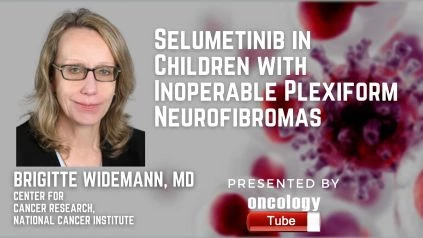Brigitte Widemann, MD, Deputy Director, Center for Cancer Research, National Cancer Institute speaks about Selumetinib in Children with Inoperable Plexiform Neurofibromas.
Link to the Study:
https://pubmed.ncbi.nlm.nih.gov/32187457/
Link to The Clinical Research Foundation is proud to announce the 2021 finalists for the Top 10 Clinical Research Achievement Awards :
https://www.clinicalresearchforum.org/page/2021Top10Finalists
Summary
Background information:
In patients with neurofibromatosis type 1, there are no accepted treatments for inoperable plexiform neurofibromas.
Methodologies:
We performed an open-label, phase 2 trial of selumetinib to evaluate the objective reaction rate and assess clinical advantage in patients with plexiform neurofibromas. On a constant dosing regimen, children with neurofibromatosis type 1 and symptomatic inoperable plexiform neurofibromas received oral selumetinib twice daily at a dosage of 25 mg per square meter of body surface area (28-day cycles). At least every four cycles, volumetric magnetic resonance imaging and clinical outcome tests (pain, quality of life, disfigurement, and function) were performed. On a scale of 0 (no pain) to 10 (extreme pain), children measured the severity of tumor pain (worst pain imaginable).
The below are the outcomes:
From August 2015 to August 2016, 50 children (median age: 10.2 years; range: 3.5 to 17.4) were enrolled. Disfigurement (44 patients), motor dysfunction (33), and pain were the most common neurofibroma symptoms (26). As of March 29, 2019, 35 patients (70%) had a reported partial response, with 28 of these patients having a stable response (lasting more than a year). The mean reduction in child-reported tumor pain-intensity scores was 2 points after a year of therapy, which is considered a clinically significant increase. Furthermore, clinically significant gains were seen in pain interference in everyday living (38 percent and 50 percent, respectively) and general health-related quality of life (48 percent and 58 percent, respectively), as well as practical results of power (56 percent of patients) and range of motion (56 percent of patients) (38 percent of patients). Five patients stopped taking selumetinib because of side effects, presumably due to it, and six others developed an illness. Nausea, vomiting, or diarrhea were the most common side effects, followed by an asymptomatic rise in creatine phosphokinase, acneiform rash, and paronychia.
Final Thoughts:
Many children with neurofibromatosis type 1 and inoperable plexiform neurofibromas experienced durable tumor shrinkage and therapeutic gain from selumetinib in this phase 2 trial. (Funded by the National Institutes of Health’s Intramural Research Program and others; ClinicalTrials.gov ID: NCT01362803.)

